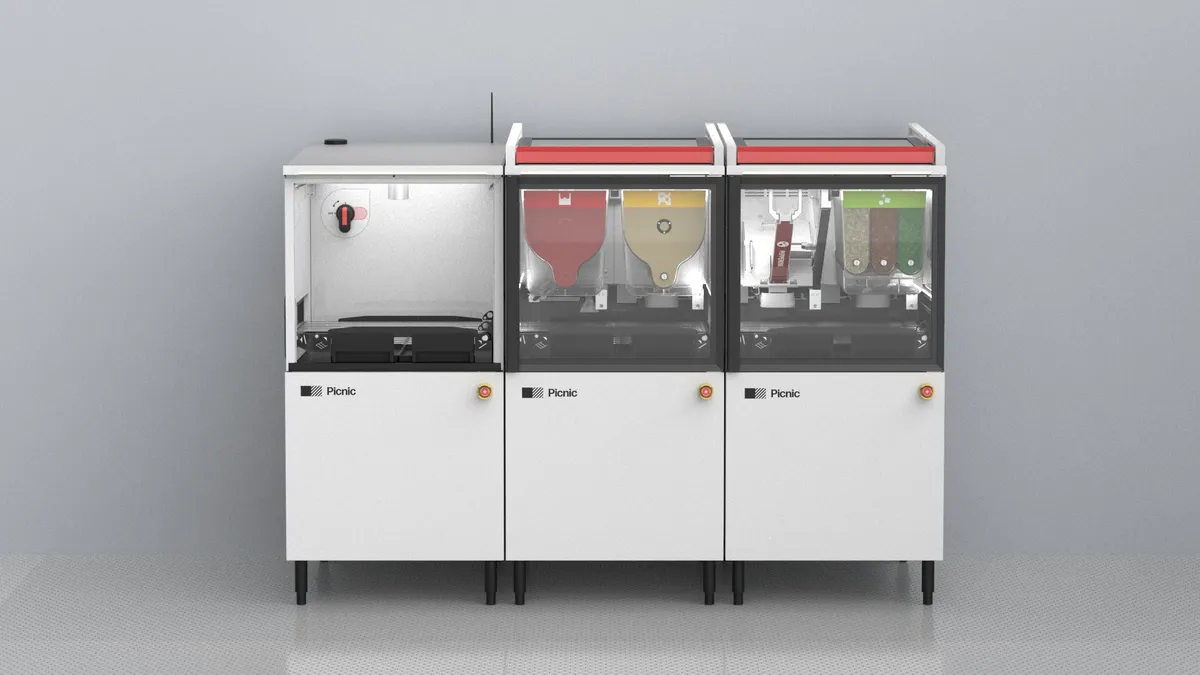Dive Brief:
- Picnic Works, an automation technology company, has signed a deal with Speedy Eats, an automated restaurant, to integrate Picnic’s automated pizza technology into Speedy Eats’ automated drive-thru kitchens. The firms plan to launch 5,000 Picnic Pizza Stations in the U.S. throughout the next five years.
- The value of the deal is estimated to be worth $800 million for Picnic, according to to a press release.
- Speedy Eats has yet to open its first location, so this partnership could help it scale quickly. Picnic was founded in 2016 and is accelerating its growth to college campuses, grocery stores, hotels and other venues.
Dive Insight:
Should this partnership reach its 5,000-unit goal, there would be more Speedy Eats/Picnic automated drive-thru locations in the U.S. than KFC, Panera, Popeyes, Sonic and Chipotle units, according to Technomic. Such scale could have major implications for automation by familiarizing consumers with the technology and proving its viability and return on investment.
Speedy Eats is targeting parking lot locations to incorporate its units, which will allow for 24-hour/seven-day-a-week access for customers who want to carry out or deliver from its menus. The firm’s standalone units are 16-by-8.5 feet and include a refrigerator, oven and warmer. They allow customers to pick up their food via drive-thru, walk-up or delivery. Speedy Eats also claims its ovens have a throughput of 45 pizzas in an hour and can fulfill some orders in as little as 20 seconds.
To support its partnership with Picnic, Speedy Eats says it is “eyeing over 40,000 potential parking lot locations in the U.S.” and plans to open regional kitchen production centers to create its food supply.
Research from Big Red Rooster shows Gen Z and millennial diners are more likely than other generations to feel positive emotions in the presence of foodservice automation. As Gen Z acquires more spending power, the food automation market is expected to increase by nearly 10% each year through 2027, according to Meticulous Research.
Although younger consumers may be comfortable with automation, they may not want it to replace human service. A fully automated model could also be a risk if ingredients run out or if there is a system failure. Speedy Eats said one employee is allocated for every three locations to manage food and machinery.
These expansion plans follows the failure of several automation startups. Zume, which was once valued around $4 billion, closed its doors in 2020. DoorDash will also shut down its Chowbotics operations 18 months after its acquisition. But Picnic has continued to grow into more markets, and other automated foodservice companies like Jamba by Blendid have as well. Several restaurant chains, including Chipotle, White Castle and Capriotti’s, have also started integrating foodservice automation into their operations, hinting at growth opportunities for food-focused automation.












